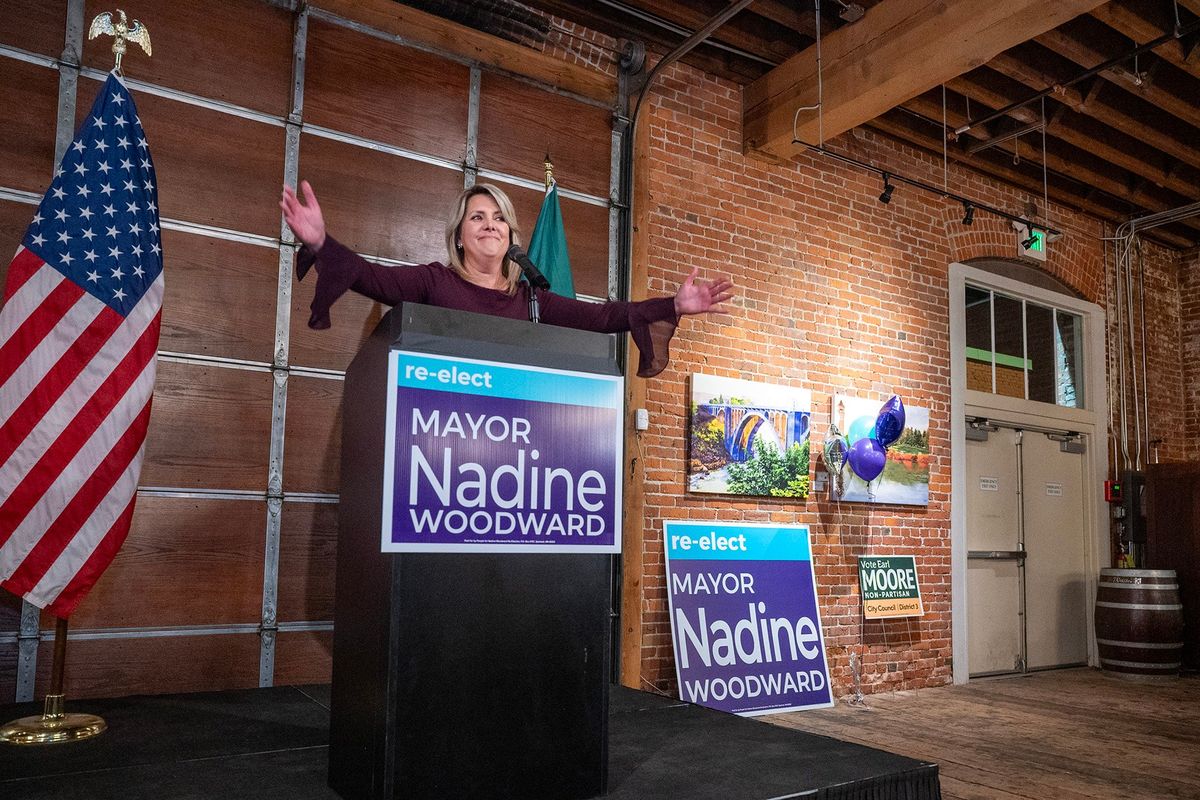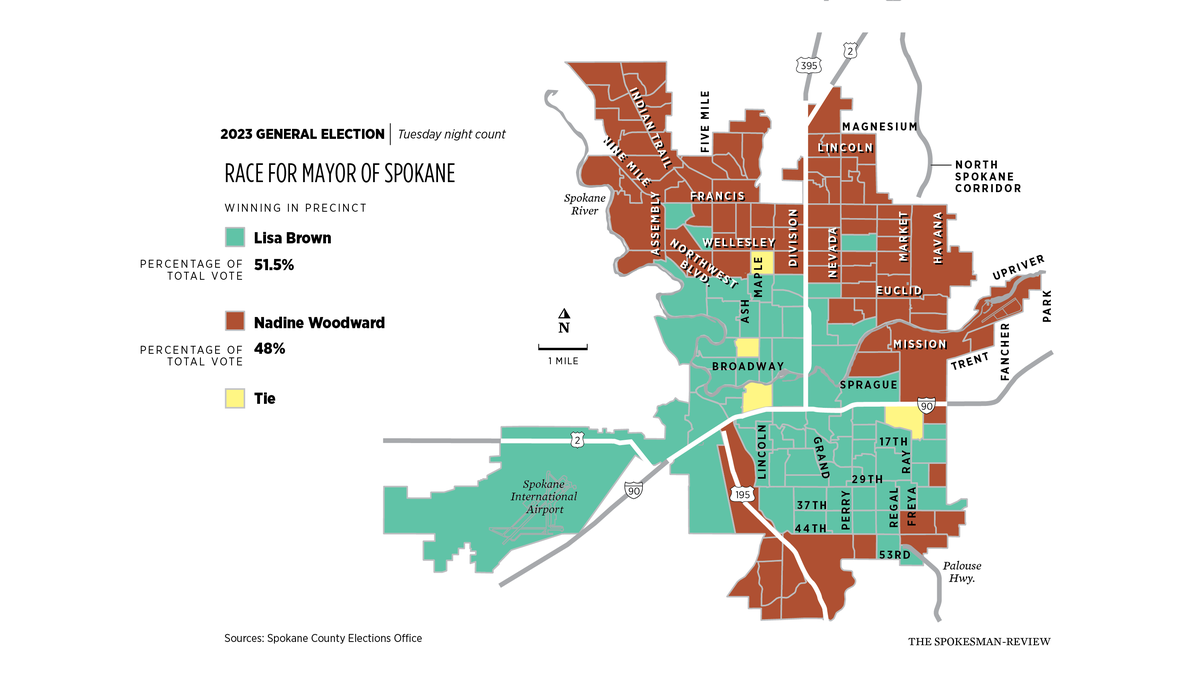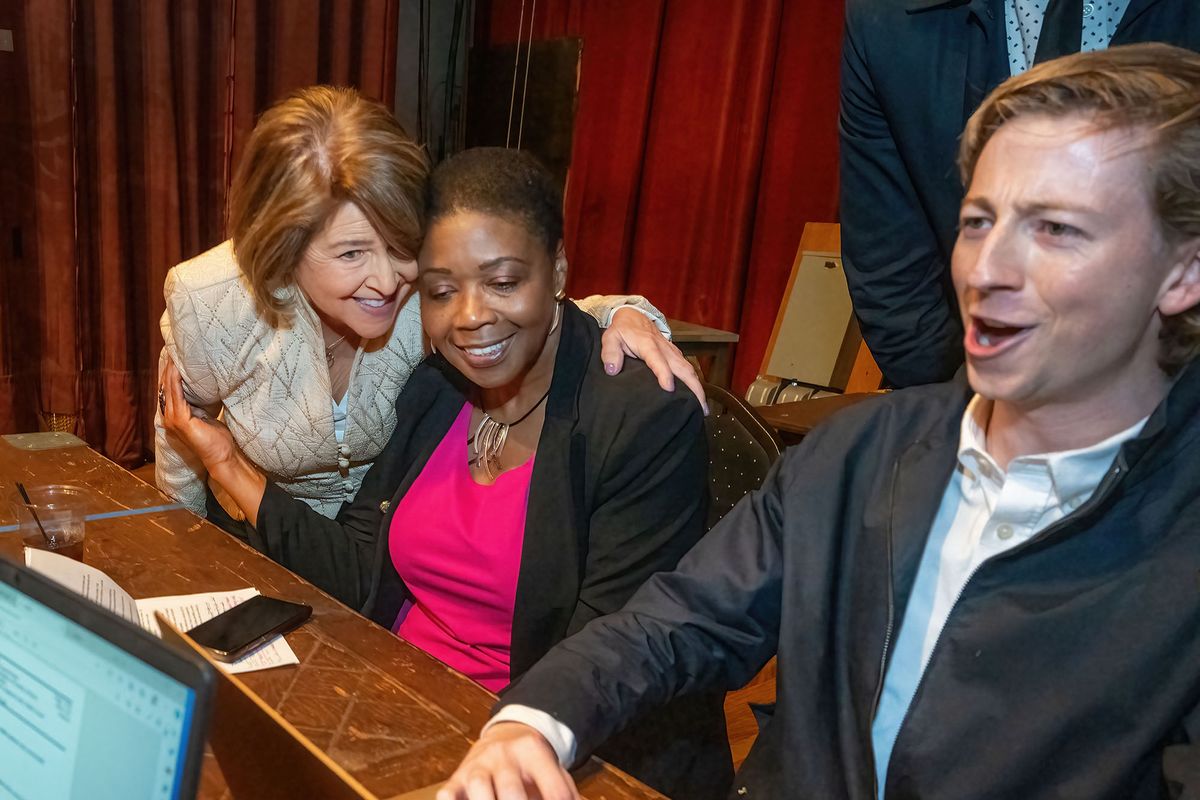Lisa Brown takes lead over Nadine Woodward in race for Spokane mayor
Spokane mayoral candidate Lisa Brown, left, and Spokane City Council President-elect Betsy Wilkerson celebrate incoming positive election results on Tuesday at the Spokane County Democrats election night watch party. (COLIN MULVANY/THE SPOKESMAN-REVIEW)
Spokane voters appear ready to make a change.
Lisa Brown is leading incumbent Mayor Nadine Woodward 51.5% to 48% in the election night count in the race to lead Spokane.
Brown’s lead is sizable, but with thousands more votes left the count, the final outcome may not be known for a few days.
“I’ve seen enough,” Brown shouted with a smile as she hopped out of a chair backstage at Riverside Place, an event venue in downtown Spokane, and walked onstage to the sound hundreds of cheering supporters at the Spokane County Democrats election night watch party. Attendees of the event held plastic cups of red wine and mixed drinks as they chanted Brown’s name in unison.
“We have some big challenges ahead of us, but I believe we can take them on together,” Brown told the crowd. “I believe we can have a compassionate and effective response to the unhoused people in our cities. I believe we can climb out of the budget hole we’re in.”
Despite her opponent’s lead, Woodward was still hopeful that later ballots would break her way.
“We got this. We got this!” Woodward said at her watch party at Barrister Winery downtown. “I anticipated that we would not know tonight the outcome for the race for mayor. We knew all along this would be extremely tight.”
She thanked her campaign staff and volunteers, and said this campaign has been the toughest challenge of her life.
“I believe we’re going to squeak this one out,” she said.
Emotions were high at Woodward’s campaign event. As Emily Strode, President of Crimson Consulting and former Campaign Manager for Rep. Cathy McMorris Rodgers, assured the audience that there were many votes left to count, a woman stood up and began shouting, “Maybe we should go back to in-person voting!”
As KHQ reporter Adam Schwager wrapped a live interview with Woodward, another member of the audience grabbed his microphone and attempted to speak into it. The woman struck him as the microphone was pulled away and was escorted out of the event.
If Brown maintains her current advantage, it could entail the end of divided government in Spokane. Woodward has frequently clashed with the liberal City Council during her time in office. The political alignment of that side of City Hall was also up in the air this election, but liberal City Council candidates won three of the four races in Tuesday’s election.
Spokane voters have not been kind to incumbent mayors running for re-election. Since the mid-1970s, only one Spokane mayor has won re-election: David Condon in 2015.
In 2019, Woodward was able to declare victory on election night after then-City Council President Ben Stuckart conceded.
It took nine days, however, for Spokane City Council President candidate Cindy Wendle to concede to Breean Beggs in 2019. Beggs had been behind by more than 700 votes on election night but gained on Wendle as more ballots were counted. He took a slim lead a week after election day, and eventually garnered 957 more votes than Wendle.
Four years ago, Woodward successfully kept the election’s focus on homelessness and the distinct visions she and Stuckart presented for responding to that growing crisis. Her “jail or treatment” rhetoric proved successful against her opponent, who failed to counter with a similarly clear, concise message that would resonate with voters.
Homelessness was the keystone issue again this election cycle, but that may have come back to haunt Woodward, who failed to reduce homelessness during her term or respond to the issue in a consistent way. Homelessness was a motivating issue for voters this year. Proposition 1, which will severely restrict where the homeless can camp in city limits, was passing with more than 75% in support.
Homelessness in Spokane County has grown by over 50% in the past four years, more quickly than the statewide average.
Though Woodward railed in 2019 against low-barrier homeless shelters, which do not require sobriety, she folded under pressure from a federal court, and the City Council and created the Trent Resource and Assistance Center, the largest low-barrier homeless shelter in the city. It has been beleaguered by costly overhead, unsanitary living conditions and allegations that it was selected to benefit a top political donor. Woodward has bristled at these criticisms, asking the state to force an ad to be taken down that amplified those claims and arguing that hundreds are off the street because of the Trent Avenue homeless shelter.
Woodward shifted blame for the lack of results on homelessness to state Democratic police reforms and other external factors, and framed Brown as a radical liberal who would create homeless encampments in neighborhoods throughout the city.
Brown and Woodward clashed over the Camp Hope homeless encampment, once the largest in the state, well before it was publicly announced they would compete in this year’s mayoral race. Woodward accused Brown, who led the state Department of Commerce and oversaw state funding to relocate those staying at Camp Hope, of interfering with the city’s own plans to clear encampment. At times, Woodward went so far as to allege Brown had conspired with service providers to create the encampment in the first place to hurt Woodward politically.
For her part, Brown and other state officials argued Woodward had been more concerned with political grandstanding than seeking realistic solutions, and have noted the state funneled around $24 million into services to help those staying at Camp Hope. Brown has said Woodward’s failure to create shelter options or support homeless services was the cause of Camp Hope, which began as a protest against a lack of low-barrier shelter beds.
Reporters Ellen Dennis and James Hanlon contributed to this story.


